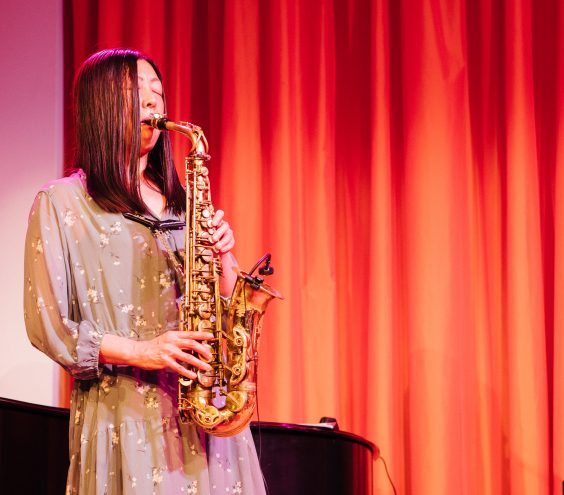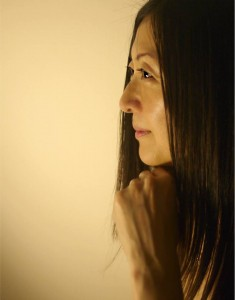More Jazz to Be Heard: Dr. Yoko Suzuki
by John Ferri / May 2, 2019 / Comments Off on More Jazz to Be Heard: Dr. Yoko Suzuki

Photo by Jared Murphy
Think for a moment of the top American jazz musicians. Whose names spring to mind? Is it Louis Armstrong … or Miles Davis? Dizzy Gillespie? In this thought experiment, it would be highly unusual for the name of a female jazz musician to be the first on anyone’s list. And while you may think of the many famous female jazz singers out there — like Ella Fitzgerald or Billie Holiday or Sarah Vaughan — you probably wouldn’t think of any female instrumentalists.
This is where Dr. Yoko Suzuki comes in. She’s a saxophonist and scholar from Japan who studies the under-representation of female musicians in American jazz. By advocating for women’s representation in jazz while simultaneously fronting her band — the Yoko Suzuki Trio — Suzuki does double duty to carry the genre’s barrier-breaking tradition forward.
In the Yoko Suzuki Trio, the daring melodies of her alto saxophone are joined by Cliff Barnes on the organ and James Johnson III on the drums. Their sound has grown to include strong Latino and Brazilian influences and can be heard in venues across Pittsburgh, where they play original compositions as well as arrangements of contemporary pieces and standards.
Last February, a few days after she led a quartet through selections from John Coltrane’s album A Love Supreme, she sat down with Sampsonia Way in her university office to talk about her dual life: how she’s at once a jazz player and a jazz scholar, and how she’s found inspiration from the great Geri Allen. Today, Suzuki credits her Osaka roots and her time as a graduate student and performer in the New York area as the genesis of her sound.
In high school, she discovered a talent for brass, playing the trombone. But it wasn’t until hearing the jazz club perform at an Osaka University activity fair that she began to see music as something more than a hobby. One day, as she was walked across campus, she suddenly heard a sound of an alto saxophone player — and when she saw him play, she simply couldn’t forget it.

Photo by Mamiko Taira
From that moment on, she could almost always be found playing the alto saxophone, teaching herself music theory. Any of her spare money went towards concerts and records. She was hooked. After graduating from college with a degree in philosophy, Suzuki decided to switch tracks and went on to earn a Master’s in Musicology at Rutgers University. And it was during this stretch of time that she began to cut her chops performing in the New York area.
Finally, in 2006, her academic pursuits brought her to the University of Pittsburgh for her Ph.D. This opened two doors. The first was an opportunity to teach and to research in a renowned Jazz Studies Program. The second was to discover an important mentor in the inimitable jazz musician, Geri Allen.
Geri Allen was a critically acclaimed jazz musician whose own career took root at the University of Pittsburgh, where she earned a musicology degree in the 1980s. From there, she went on to become an internationally-acclaimed jazz-piano performer and composer in New York and New Jersey. Her 2006 composition “For the Healing of Nations,” dedicated to 9/11 survivors, along with her efforts to help female jazz musicians launch their careers, earned Allen a 2008 Guggenheim Fellowship. And in 2013, she returned to Pitt as the Director of Jazz Studies and as an associate professor of music, on a mission to include more women in Jazz Studies concerts and programs.
And, yes, Yoko Suzuki would join Allen on this scholarly quest — but she also found her to be an ally in unexpected ways, finding a mentorship to have slowly blossomed. One day, after hearing Suzuki’s alto saxophone through the muffled doors of the Music Building practice rooms, Allen called Suzuki on the phone and encouraged her to perform more. And it turned out, this was just the nudge that Suzuki needed. After this, she started playing around the city more frequently, eventually forming the Yoko Suzuki Trio.
Since Allen’s tragic passing in 2017, Suzuki and her colleagues have begun creating a proper body of research to preserve Allen’s legacy. This past semester, Suzuki taught a graduate seminar that introduced students to Allen’s career and accomplishments. Suzuki’s hopes these seminars will yield a full-bodied archive, curating an annotated discography, performance annals, a list of original compositions, and a biography. Researchers will also compile an oral history of Allen’s life and career from the perspectives of people who knew her. In a sense, the research that Suzuki is doing to cement Allen’s legacy continues the work that Allen began during her time in Pittsburgh: raising the voices of female jazz musicians.
When we think of jazz as a barrier-breaking art-form, we think of Louis Armstrong speaking out for civil rights, or of Dizzy Gillespie promoting peace with an international music tour officially sponsored by the U.S. Department of State. But, by sitting with Suzuki and hearing her story, we learn that big gestures can come in small packages, whether it’s a walk across campus that creates a life-long passion for music or a telephone call from Geri Allen that rekindles a performance career. There’s always more jazz to be heard.
For more on Yoko Sukuzuki visit her website.




